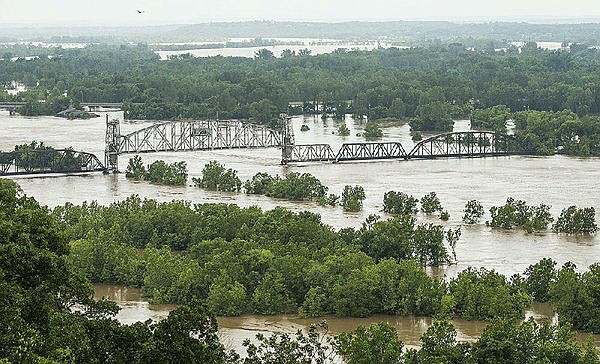FORT SMITH -- Federal reimbursements from flood damage are on their way, according to the city's consultants.
The Arkansas River in May and June 2019 rose to more than 40 feet, damaging several hundred homes and businesses in Fort Smith. The flood disabled 12 pump stations and two retention basins and almost destroyed the city's port, according to a memo from City Administrator Carl Geffken.
As of Tuesday, the city hadn't received a $10 million reimbursement from Federal Emergency Management Administration to repair flood damage, the memo states. The reimbursement could be as high as $14 million and as low as $7 million depending on damage assessments and mitigation costs, disaster recovery specialist Jamie Vernon told the board at its Tuesday study session.
Vernon, hired with Witt Global to assist the city in the reimbursement process, told the board city officials can expect to know how much money is coming their way by end of 2021 or beginning of 2022. He said municipalities waiting two years on FEMA reimbursements for natural disasters is common during covid-19.
"FEMA during the pandemic did not put out field staff, so there were no field staff who went out in the field to do additional site inspections or any engineering," said Vernon.
The city has paid for 10 of the 16 projects in the damage repair, Vernon said. Geffken mentioned the city used some money set aside for its sewer consent decree agreement to pay for flood repairs. The city has almost $350 million in unfunded costs for the federally mandated projects in the decree to address sewer deficiencies that for decades allowed sewage into the Arkansas River.
When it comes to the reimbursements, Vernon told directors the damaged pump stations are eligible for 100% flood mitigation costs.
"If you have $100 of damages, you get $100 in mitigation, so we have to make sure their cost estimates give us the fullest amount of our damages," said Vernon.
Vernon said there's "a little bit of fluctuation" between FEMA's cost estimate and those of Hawkins-Weir, the engineering firm assessing the damage. But whatever the final damage is, the city should still get significant money up front, Ward 3 city director Lavon Morton said.
"Based on the fact that we've already done a lot of this work already, if they draw down based on completed work, we should be able to draw down substantial percentage," Morton said.
Geffken said the process would have been long even without covid-19 restrictions. He said the city's damage assessment is necessary.
"They come in saying, 'Hey, this is going to be easy, this'll be straightforward,' and it is if you accept all of their numbers and all of their information, and that's really, in a nutshell, the world that Jamie lives in for us, because that's not going to be sufficient for us to rebuild what we need to rebuild," he said.

More News
Historic event
The Arkansas River flood of 2019 was caused by early snowmelt in the Rocky Mountains and record rainfall on the Great Plains, forcing the release of reservoirs in Oklahoma. It was one of the costliest natural disasters in Arkansas history.
Source: Encyclopedia of Arkansas

